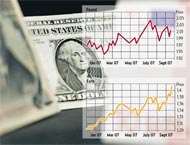Kiev mayor targets dead taxpayers to cover city hall deficit
 Kiev - It used to be that Kiev City Hall stopped trying to make money off taxpayers once they were finally dead.
Kiev - It used to be that Kiev City Hall stopped trying to make money off taxpayers once they were finally dead.
That was before the world financial crisis struck the Ukrainian capital - and Kiev Mayor Leonid Chernovetsky's scheme to make visiting a municipal cemetery, and one's deceased relatives, subject to an admission fee.
The six-dollar equivalent entrance charge would, as first described by Chernovetsky subordinates last week, is taken from every man, woman, or child entering a cemetery within Kiev city limits.
"It's shocking. How dare they try to take a toll on the dead?" demanded retiree Klavdia Efomenko during a visit to Kiev's Baikovo cemetery. "Have those big bosses no shame left at all?"
The importance of visiting loved ones' graves is deeply-embedded in Ukrainian culture, traditionally to lay flowers and drink toasts at the two-week, 40-day, and one-year anniversaries of the death, as well as during Easter in following years.
Violent objections by Kiev religious leaders and secular media pressured Mayor Chernovetsky, a financial magnate proud of running his banking empire with tight-fisted economy, to back off somewhat from the per person charge.
During a recent visit to Baikovo cemetery by a dpa reporter, entrance on foot was free, but driving a vehicle inside cost just over a dollar.
But the battle to squeeze money out of Kievietes has gone on. Chernovetsky is struggling with a tide of red ink, a yawning 1.2 billion-dollar gap between projected 2009 city income and expenditures, according to a Fokus Ukraine news agency report.
Funeral services in Kiev, according to witnesses, are largely performed by city employees motivated by bribes, making the business a potential municipal gold mine, the energetic Chernovetsky argued.
Perhaps the most imaginative new offer by the mayor allows well- to-do Kievites for the first time to purchase final resting places for departed dogs and cats, next to their owners if wished - at a cool 1,000 dollars fee per pet.
"You want to bury your beloved frog, please, we are happy to help you," Chernovetsky said. "Just pay."
At the Baikovo cemetary, a single store was offering flowers for bereaved to lay at the graves - Kiev Ritual Store Number 1, owned and operated by the Kiev city administration.
Funeral arrangements such as grave-digging, headstone construction and hiring a priest are all on offer "at competitive rates," a store worker said.
Even Kiev coroners have not been spared from Kiev City Hall's arguably somewhat morbid search for cash.
A January decree made coroners, formerly employed by the Health Ministry, city employees at the swoop of a pen, and obliging them to charge set fees for autopsies, to be funneled into the city budget, Chernovetsky opponents charge.
The Kiev's funeral industry long has been paying city cemetery staff money on the side for special services, and it is only fair that the city of Kiev get its cut of the action, Chernovetsky countered.
"It's amazing what goes on, half of the morgues are reserved for the rich, and they are in such comfort, it's as if they will come back to life from the air conditioners, refrigerators, and reserved spots in the cemeteries they have," Chernovetsky said, according to a Channel 5 television report.
A high-profile spot in a top Kiev cemetery sells on the black market for as much as 50,000 dollars - money the city needs, he added.
With on average 100 persons buried in Kiev daily, Chernovetsky's campaign to redirect dead person-related revenue away from the shadow economy could net city hall
100,000 dollars a day, according to an Unian news agency web report.
Other Chernovetsky money-making gambits include doubling the cost of a trip on public transport, tripling water and garbage pick-up bills, "adoption" of favoured animals at the city zoo, and a sell-off of automobiles owned by the city.
His most controversial cash-generating idea so far has been to make non-emergency medical care provided by city clinics and hospitals fee-based.
His enemies already have challenged the proposal in court on grounds Ukraine's constitution guarantees free health care to all citizens.
Faced with a disastrous drop in revenues as Ukraine's economy has slowed down, Chernovetsky has tried to impose free market belt- tightening on the Kiev's Soviet-like city administration as well, banning outright purchases of new automobiles, furniture, mobile phones, microwave ovens, computer upgrades, and even tea heaters by city employees.
The world economic slowdown has affected the Mayor's personal lifestyle less, with Chernovetsky announcing last week he had purchased an Italian-built helicopter to commute to work, as Kiev traffic was delaying his Rolls-Royce too much "for me to serve the voters properly." (dpa)